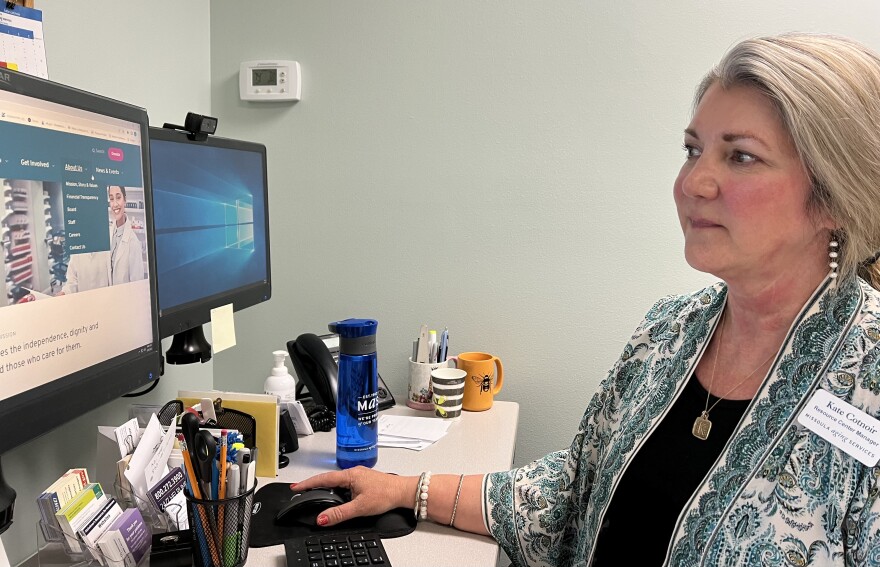Runaway inflation slightly eased last month, but consumer prices remain painfully high.
With Americans’ purchasing power eroded this year, older adults are among those being squeezed the hardest while being least able to afford it.
80-year-old Judy Allen is one of millions of older Americans now struggling to make ends meet.
“I live on a fixed income and it’s very hard right now."
The Missoula resident has just returned from the grocery store where she’s noticing her 'food stamp,' or SNAP benefits, are not keeping pace with food prices.
“I look on my list – I always have to take a list now – and there are some things I can’t even buy this month. I have to wait until next month because I won’t have the money or enough food stamps to go around.”
Allen’s working life started in 1963 as a bartender in Las Vegas.
“Yeah, I was young! Of course, the stars and the lights got me [chuckles].
She says she made great money in tips during her 25 years tending bar in Vegas. An injury led to a mid-life change of career as a medical technician; a job she kept until her retirement in 2009.
Allen says the transition from steady career paycheck to a fixed retirement income was a " ... very, very, very, very hard adjustment."
And that’s getting even harder as prices climb.
More Montanans than ever before are having to navigate aging during a time when inflation levels are near a 40-year high.
Montana’s aging population is sixth per capita in the nation and a state health department plan to respond to the demographic shift refers to an ‘aging tsunami’, with close to a quarter of the population now over 60 years old.
Iola Winters, a volunteer senior companion for Missoula Aging Services, sees the economic insecurity in older adults every day.

“It’s depressing when you see someone that has a small income and you know that they're not buying the groceries that they need to sustain themselves."
Winters is an energetic 81-year-old who helps clients with errands, transportation and shopping needs. She tells MTPR she’s concerned about the health of some of the older adults she works with who are increasingly settling for less expensive and less nutritious food options loaded with salt, sugar and preservatives.
Winters also notices more retirees are now re-entering the workforce to help make ends meet.
“I’ve never seen anything like this before.”
This all sounds familiar to Ramsey Alwin, the President and CEO of the Virginia-based non-profit National Council on Aging.
“It’s really, really tough."
According to the U.S. Census Bureau the year 2030 will mark an important demographic turning point in U.S. History. That’s when all baby boomers will be older than 65.

Alwin describes the medical breakthroughs enabling Americans to live longer as an "amazing gift of longevity."’
“But the challenge is, as we grow older and our health issues continue to evolve, there are more out-of-pocket costs. And for so many, outliving those resources literally keeps them up at night.”
According to a 2019 Federal Reserve report, nearly one in four Americans have no retirement savings.
Older adults are increasingly trying to get by on their monthly social security benefits. On average, this year that amounts to about $1,600 a month for an individual.
And according to NCOA’s Ramsey Alwin, Social Security’s annual cost of living adjustment doesn’t come close to keeping up with inflation or Medicare premium increases of over 14 percent.
"Layer on top of that, these unprecedented inflation rates at 9 percent and climbing, and you can see how Social Security really does come up short," Alwin says.
This year’s social security increase was just shy of six percent.
The National Council on Aging offers a program connecting older adults and people with disabilities to potential money saving benefits.
NCOA’s Ramsey Alwin says older adults annually leave billions of dollars in unclaimed benefits on the table.
"Only about half of older adults that are eligible for food assistance, or SNAP, are enrolled. Getting enrolled can add, on average, $100 back into that monthly food budget.”
Voters in Missoula County recently voted overwhelmingly to support a levy to fund Missoula Aging Services’ work connecting older adults with services that can help them age.

The agency wrote ahead of the vote that it faces challenges keeping up with the growing needs of an increasingly older population.
Katie Cotnoir is an Aging Services manager.
Cotnoir says, "It's money that we needed anyway, but of course it's given us that ability to plan for the future and continue the important work that we do. So, it's really vital."
Missoula Aging Services and all of Montana’s Area Agencies on Aging offer benefit checkup services covering federal, as well as state and local resources. Older adults can see if they’re eligible for these free services. Qualifying applicants could potentially get assistance with Medicare, prescription drug, food, housing, property tax or energy costs.
Back in Missoula, Judy Allen – a former senior companion herself – encourages her fellow older adults to sign up for a benefits screening. The possibility of a little extra financial help every month sounds good to her.
Allen says she and her friends frequently get together to share stories, laugh and commiserate.
Times are tough, she says — but chin up, things will eventually get better – adding with a wry smile, "Whoever said it was the Golden Years – I’d like to choke them [Laughter]."


